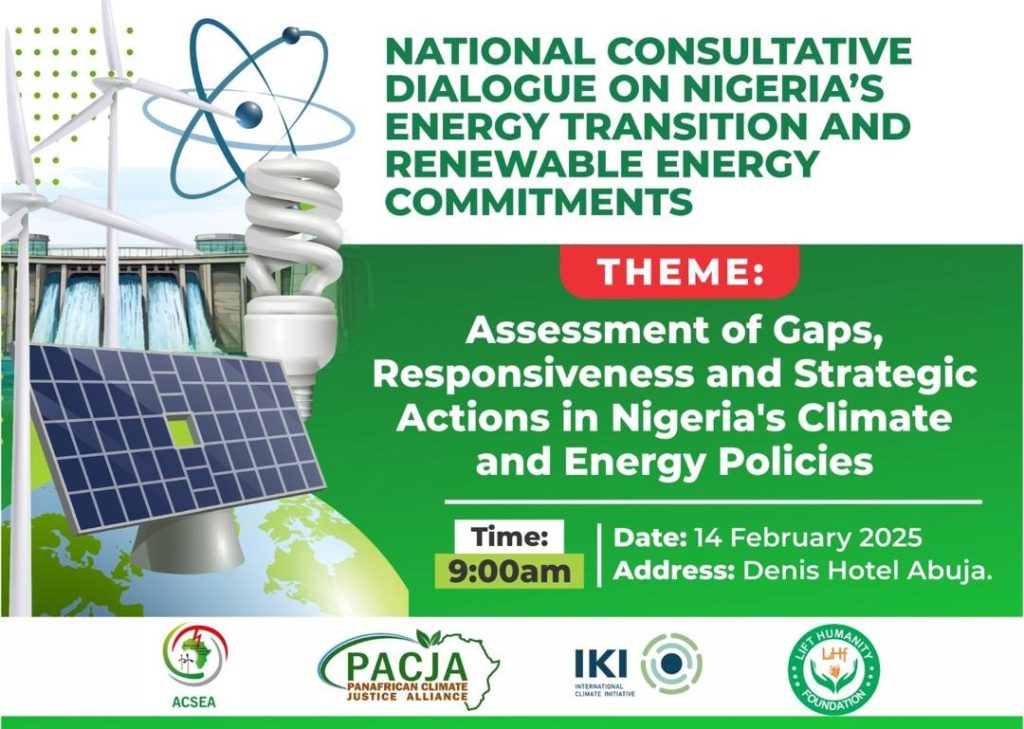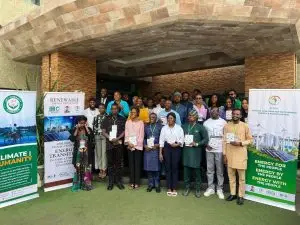
Written by Magdalene Ime Idiang
Nigeria’s positioning in the global energy crisis is both crucial and precarious. The country has one of the highest energy poverty rates on the continent with 6 out of every 10 Nigerians without access to any form of electricity while simultaneously experiencing some of the worst impacts of the climate crisis[1]. This has created a triple crisis in food, energy, and climate, posing significant challenges for adaptation and mitigation measures. The struggle to implement sustainable energy solutions in Nigeria is ongoing, requiring urgent and effective policy responses.
From within this framework, Nigeria’s Energy Transition Plan (ETP)[2] became a critical response to the interconnected crises of climate change and energy poverty. With nearly 90 million Nigerians still lacking access to electricity, the transformation of the country’s energy system is imperative. The ETP sets an ambitious goal of achieving net-zero emissions by 2060 while ensuring that energy remains affordable, sustainable, and locally owned. However, despite these aspirations, the country continues to face rolling blackouts and frequent electricity grid failures. The need for modern, environmentally safe, and sustainable energy systems, grounded in the principles of equity and justice, is more urgent than ever.
Since independence, Nigerian governments have pursued energy provision by attracting investments from multinational corporations such as Royal Dutch Shell, Mobil, Chevron, and Total[3]. These corporations have predominantly developed large fossil fuel-based projects, with high-voltage transmission lines supplying urban and industrial areas. This approach has left millions of Nigerians, especially those in rural areas, without access to electricity while exposing them to the environmental and health impacts of fossil fuel pollution. Communities that suffer these effects receive little to no compensation, deepening socio-economic disparities.
In response to these injustices, communities affected by fossil fuel extraction, including women and youth have organized nonviolent resistance against oil firms to reclaim their lands, livelihoods, and homes. A recent example is the ongoing protest by residents of Ogale in the Niger Delta against the planned resumption of fossil fuel extraction in their region. The protesters, carrying placards and chanting resistance slogans, condemned the government’s decision as a betrayal of environmental justice.
Community leaders in Ogale emphasized that rather than reopening oil wells, the government should prioritize cleaning up the long-standing contamination and investing in sustainable livelihoods. Protesters also questioned Nigeria’s commitment to its Energy Transition Plan, arguing that expanding fossil fuel projects contradicts global climate goals and further endangers local communities already suffering from environmental destruction.
The community also called for Shell to be held accountable for its historical role in polluting their land and water. The landmark case in which Ogale and other Niger Delta communities are suing Shell in the UK for decades of oil spills remains a critical step toward environmental justice. Before any discussions about resuming oil operations, Shell must first clean up the environmental damage and compensate affected communities.
A Questionable Commitment to Energy Transition
As we march forward with the quick trip of achieving energy transition in 2050, we need to ask ourselves questions relating to pace the transition should be played out. Although Nigeria has formally initiated a shift toward renewable energy, including the Energy Transition Plan of 2022 and the Climate Change Act, implementation remains a major challenge. The government’s plan to resume oil operations raises concerns about whether the ETP is a genuine commitment or merely a response to a new Western consensus on climate change.
In contrast, other African countries have made significant strides in renewable energy development. Morocco, for example, has completed the world’s largest concentrated solar power station, aiming to power one million homes[4]. Similarly, Kenya has been a continental leader in geothermal power generation, producing the bulk of its electricity from geothermal sources. The Olkaria Geothermal Power Station in the Great Rift Valley is Africa’s largest geothermal power project, serving as an example of how countries can successfully transition to sustainable energy.
Addressing the Challenges of Energy Transition in Nigeria
The African Coalition for Sustainable Energy Access (ACSEA), through its Nigeria Platform, Lift Humanity Foundation (LHF), and Ecosteward and Humanitarian Foundation (EHF), has conducted extensive reviews of the Nigeria Energy Transition Plan (ETP) (2022) and other related policies[5]. While discussions on climate change and energy transition have long centered on emission reduction targets, these organizations have gone beyond policy assessments by organizing consultative workshops to raise awareness and concerns about the ETP’s clauses and advocate for a people-centered implementation mechanism. These recurring awareness dialogues have underscored the consequences of neglecting the Nigerian ETP, particularly regarding its social, environmental, economic, and cultural impacts. They have also emphasized the importance of broadening the local impact of these policies and connecting the current energy transition plan to the challenges of unemployment, ultimately fostering a climate-resilient society.
A major concern raised during these discussions is that many renewable energy projects in Nigeria tend to replicate the structure of conventional fossil fuel-based energy projects. These initiatives are often large-scale, centrally owned, and integrated into the national grid, relying heavily on international financing and public-private partnerships. As a result, local communities, which lack the financial and technological capacity to compete with foreign companies such as Ormat Technologies—are frequently excluded from policy decisions. Furthermore, international financial institutions, including the World Bank and the International Monetary Fund (IMF), exert substantial influence over these projects, often prioritizing financial returns over the needs of local populations. This top-down approach to energy policy formulation must be challenged to ensure that Nigeria’s ETP genuinely serves the interests of its people.
The Path Forward: Ensuring no One is Left Behind.
With already existing policies drafted and implemented to allow only the wealthy have access to Renewable energy infrastructure, the ultimate question in Nigeria’s energy transition remains how to make renewable energy affordable and accessible, particularly in a country marked by severe income inequalities. Equally important is ensuring that communities have ownership over the various energy mix through off-grid and mini-grid options. Without community ownership and control, renewable energy could remain as exclusionary as fossil fuel-based systems.
To achieve true energy democracy and access in Nigeria, a two-pronged strategy is needed. First, targeted subsidies for the renewable energy sector must be dramatically increased, while import duties and production costs for renewable technologies should be reduced. Second, Nigeria must invest in appropriate technology transfer to boost generation and supply, research and development, training, and capacity-building. Intellectual property rights laws that undermine pro-poor development must also be challenged to ensure access to affordable clean energy technologies.
The success of Nigeria’s Energy Transition Plan will depend on how well it addresses these structural issues. A just transition must prioritize social equity, environmental protection, inclusive governance and economic empowerment for all citizens. By learning from successful renewable energy initiatives in other African countries and ensuring that communities play a central role in decision-making, Nigeria can create a sustainable and inclusive energy future.
Nigeria stands at a crossroads in its energy transition. While the ETP presents an ambitious vision, its implementation must align with the material realities of the Nigerian people. Fossil fuel expansion contradicts the goals of a just energy transition and undermines environmental justice. True progress will only be achieved through policies that prioritize local ownership, affordability, and sustainability. By investing in decentralized renewable energy systems and ensuring community participation, Nigeria can move towards an equitable and sustainable energy future that serves all its citizens.
Written by Magdalene Ime Idiang
For EHF
[1] Africa Energy Outlook 2022 – Analysis – IEA
[2] https://www.energytransition.gov.ng/
[3] https://core.ac.uk/download/pdf/234668715.pdf
[4]https://esfccompany.com/en/articles/solar-energy/noor-ouarzazate-the-world-s-largest-concentrated-solar-power-plant-csp-built-in-morocco/
[5]https://www.acsea54.org/wp-content/uploads/2024/03/Renewable_Energy_Governance_Report-BCCN.pdf

